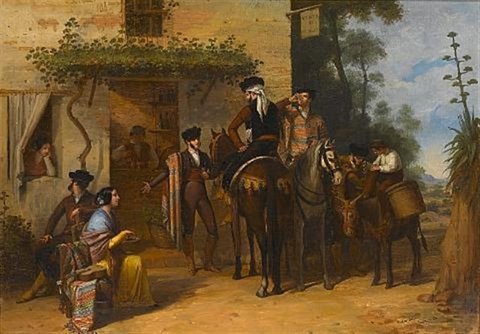Der andalusische Costumbrismo
Gegen Ende des 18. und zu Beginn des 19. Jahrhunderts wurde der sogenannte andalusische Costumbrismo entstanden.
Im Jahr 1783 wurde die soziale Lage der Roma von Karl III. von Spanien geregelt. Nach jahrhundertelangen Verfolgungen und Ausgrenzungen wurde die rechtliche Situation dieses Volks beträchtlich verbessert.
Nach der Unabhängigkeitskrieg Spaniens (1808-1812) hat ein Gefühl von Stolz, im Gegensatz zur französischen Bewegung der Aufklärung, an Bedeutung gewonnen.
Die Gestalt von majos, eine populäre Persönlichkeit dieser Zeit spielte eine große Rolle. Der Traditionalismus sieht die Roma als ein Modell des Individualismus. In dieser Umgebung war die Mode cañí und die Stierkampfschulen von Sevilla und Ronda (Málaga) besonders erfolgsreich.
Nichts zu vergessen sind die Aufschwung der Straßenräuber und die Faszination der romantischen Reisenden in ganz Europa für Andalusien.
Alle diese Elemente bildeten einen Geschmack für den andalusischen Costumbrismo. Ein wirklicher Sieg im Gericht von Madrid.

Escena andaluza (1849), Joaquín Domínguez Bécquer